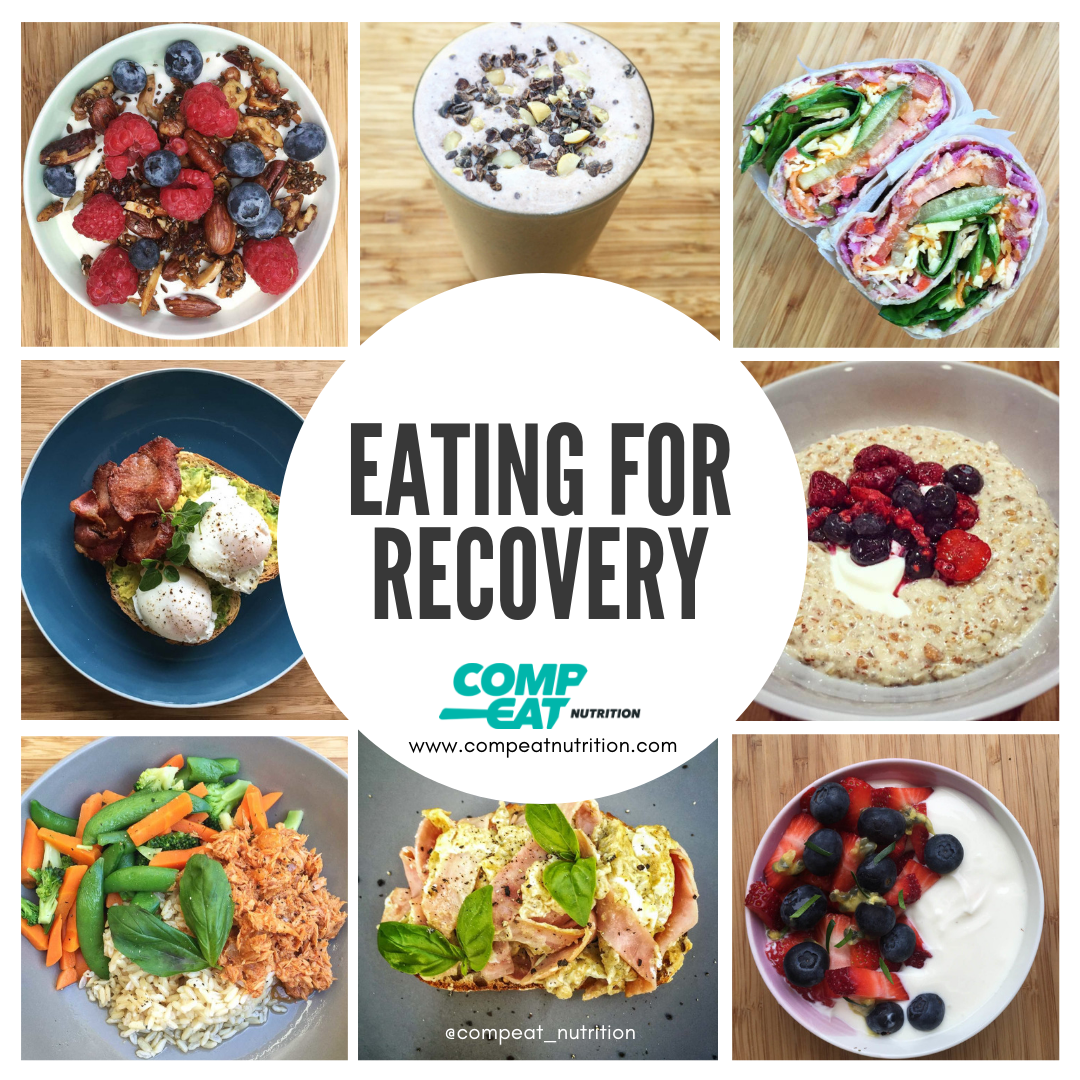Food For Recovery
Recovery. Such a massive topic – between ice baths, pressure boots, rollers, massage and sleep, where does nutrition fit into it all?
The benefits of nutrition when it comes to recovery are pretty impressive – so if it isn’t something currently at the front of your mind, read through the key considerations below and get cracking!
When is Recovery Nutrition Important?
No matter if you are training once per week or more than 10 times a week, recovery nutrition is something that can absolutely help with performance – both in life and in your sport.
Now the good news is, that all your hard work isn’t wasted if you miss the often over exaggerated 30 minute ‘Window of Opportunity’. There is no need to obsess or become anxious about this window, even though we know that muscle fueling does peak at around the hour mark. However, as refueling is not only needed in the first hour, but rather the next 24-48hrs, there is plenty of time to consider and optimise your recovery.
So if you have done a pretty easy session or have a full day to recover before your next training session, chances are that you can just use your next planned meal or snack as your recovery food – as there is no need for fancy supplements or sports foods unless they offer convenience or help if you have high energy needs.
However, if you have multiple training sessions planned for the day or have undertaken an intense or long workout/event, you will need to pay more attention to your recovery nutrition. The sooner you start to restore muscle glycogen and repair damaged muscle, the faster your recovery will be for the next session. So if you can, aim to get your first recovery meal or snack in within the hour and then continue with intake from there!
Simplifying Recovery with the 4 R's
Repair
Refuel
Rehydrate
Revitalise
Refuel
The refuel is all about restoring the energy you just used during the event or session. In sessions that are high intensity, long and sustained or involve intermittent efforts, these place a high demand on carbohydrate stores. To optimise recovery and help restore energy ready for the next session.
Carbohydrate can be found in options such as:
Breakfast: Oats, toast, beans, muesli/cereal, yoghurt and milk
Snacks: Yoghurt, milk, fruit, muesli, dried fruit, crispbread, toast/crumpet, smoothie
Lunch: Bread, rolls, wraps, rice, quinoa, pasta, fruit, yoghurt
Dinner: Rice, quinoa, couscous, pasta, breads, potato, sweet potato
Repair
To switch on all those amazing cellular pathways for optimal recovery, your recovery meal/snack should also include at least 15-25g of protein along with the carbohydrate. Protein is made up of the building blocks to muscle – amino acids. The amino acids are broken down to enter the muscle to help with the repair and rebuild after exercise.
Protein sources could include:
- Dairy – such as milk, yoghurt, cheese
- Eggs
- Animal protein such as beef, pork, chicken, fish
- Lentils, legumes, beans
- Nuts and seeds
- Protein powder supplements (convenience)
Rehydrate
Optimising recovery also means thinking about your hydration. To replace all your lost fluid after a session, aim to drink amounts that reflect your thirst levels and also how much you have lost.
A simple calculation you can use is to weigh yourself before and after the session to work out (roughly) the amount of fluid that is lost. The difference between the two weights will reflect a good estimate of the amount of fluid you have lost during the session. Multiply that number by 1.5 and aim to drink this amount in the 3-6hrs after the session.
e.g. if you lost 2kg during the session, aim to drink 3L of fluid in the hours following - along with your recovery food.
Spacing the fluid out well over this time and having it with food, will help optimise how efficiently you can absorb the fluid and restore hydration. imply restore 1.5x that amount over the 3-6 hours following a session. Spacing it out over a longer period and adding electrolytes will ensure that you optimise the amount of fluid your body is capable of absorbing.
Revitalise
Revitalising is all about the colour! In the hours (and days) after your session, including variety from foods such as fruits, salads and veggies, offers some serious bang for your buck. These little gems will help with recovery, inflammation, health and immune function.
It can be difficult to get these types of foods in after a hard session – and particularly hard with the low appetite after a hard event! In this case, it is more about making the later meals and snacks count, where more fruits and veggies can be included in larger amounts to help facilitate the recovery process.
In the immediate recovery, you may be able to sneak in colour through berries, or some greens in a smoothie.
What are the best options to eat after a tough session?
If you can conveniently access them, real foods are ideal recovery options to incorporate into your training day. However, sometimes more convenient food options are needed to ensure that recovery fits into a hectic work-life-family-training schedule!
Here are some of our favourites (and often ones that we crave mid-session!):
- Eggs & Bacon (or Beans) on Sourdough with a milk-based coffee;
- Fruit Smoothie – based on fruit, Greek Yoghurt and added protein powder if desired;
- Greek Yoghurt (e.g. Chobani) with chopped fruit/berries & muesli clusters or nuts;
- Meat or Egg Salad Roll or Wrap;
- Tin of Tuna or Beans with an Instant Brown Rice Cup + Veggies;
- Oats cooked with milk then topped with nuts & seeds for an added boost
- Bircher Muesli
- Any of your favourite dinner meals that combine a mix of quality protein, along with quality carbs and veggies/salad.

AND…Some other Convenient Options:
- Takeaway Salad & Meat/Egg Roll or Wrap
- A Carbohydrate & Protein containing powder such as Sustagen Sport OR Endura Optimiser – made on milk for an extra boost;
- Whey or WPI Protein made on Milk (rice milk is a great non-dairy option as it has more carbs). If making on water, add in a carbohydrate-based snack with it;
- Greek Yoghurt pouch with fruit or muesli bar
- 250-350mL Energize Up & Go OR Sustagen Sport Tetra
- Protein Bar (containing 15-30g protein) WITH a banana
Part Two
Stay tuned for Part Two of the Recovery Series where we talk some of the very sweet extras you may want to integrate into your recovery nutrition once you have the basics down!

ALICIA EDGE HEAD SPORTS DIETITIAN
Alicia is the head Advanced Sports Dietitian at Compeat Nutrition. She is also a mum and triathlete, so advice extends beyond the basics and is instead focused on providing effective and achievable nutrition for both training and racing.